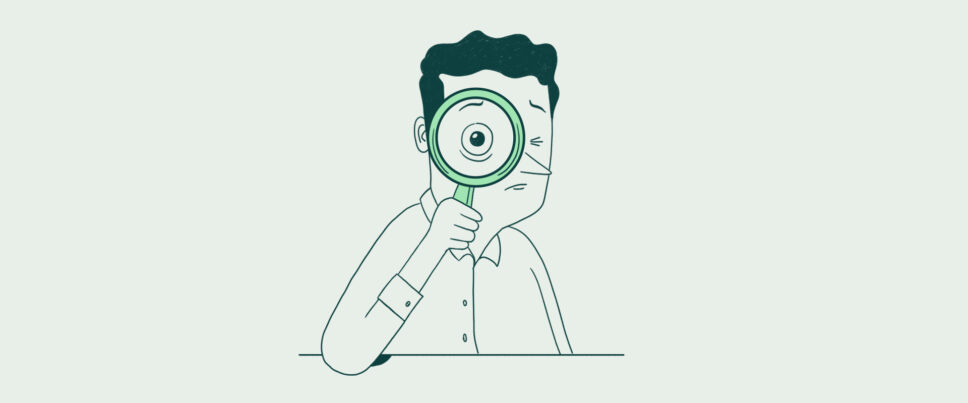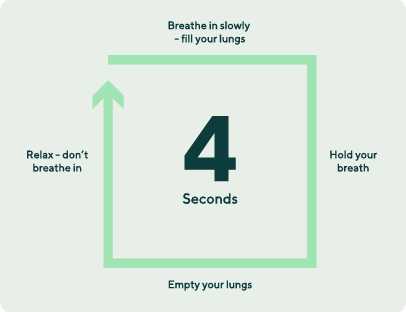
We all experience stress – it’s a normal part of our everyday lives. The World Health Organisation defines stress as “Any sort of change (aka a stressor) which causes physical, emotional or psychological strain. Stress is your body’s response to anything that requires action or attention.”
We can experience stress acutely or chronically. Acute stress is a short-lived physiological or psychological reaction to a stressor, and it can make us more resilient. Chronic stress, however, has a negative impact on our health – it can cause fatigue, depression, hypertension, and a weakened immune system.
It can also lead to weight gain. When we’re stressed our bodies’ cortisol (stress hormone) levels increase, but if they don’t go back to normal this can lead to increased appetite, reduced muscle mass (so you burn less calories at rest), and a slower metabolism which can all lead to weight gain and difficulty losing weight.
In this article we’ll look at how to identify stress, and ways to manage acute stress.
What are the causes of stress?
There are various different types of stressors:
Environmental (noise, crowds, living conditions)
Occupational (work, deadlines, studying)
Financial (bills, debt)
Social (relationship problems, time demands, dwindling social batteries)
Physiological (illness, poor nutrition, sleep disturbance)
Changes to routine (moving, travelling, change to job)
How do we know if we’re stressed?
The following symptoms can help you identify when you’re stressed. Tick the symptoms you’ve experienced to a significant degree over the past month, then calculate the total number to find out your stress level.
Physical signs of stress:
Stomach pain, nervous stomach or ulcers
Cramps, bloating, diarrhoea or constipation
Appetite or weight change
Hypoglycaemia (low blood sugar)
Stiff or sore joints, muscle tightness, cramps or spasms
Neck, shoulder, chest or back pain
Migraines, tension headaches, tightness or pressure in your head
Frequent colds or illness, or persistent fever
Sore throat or cough o Fever blisters
High blood pressure
Rapidly beating heart, even at rest
Shortness of breath
Nervous tick or twitch
Skin conditions: rashes, hives or skin irritation
Fatigue, lack of energy
Cold hands and feet Emotional or psychological signs of stress:
Feeling overloaded or overwhelmed
Feeling ‘out of control’
Frequent worrying or obsessing
Anxiety or unexplained/irrational fears
Frequent or recurring nightmares o Frequent irritability
Feeling angry and resentful o Mood swings
Depression
Crying spells
Frequent guilt
Boredom
Apathy, dissatisfaction, less interest in activities that are usually enjoyable
Loneliness
Feeling inadequate, powerless or hopeless
Behavioural signs of stress:
Excessive TV watching or video games
Use of alcohol, cigarettes or recreational drugs
Overeating or under-eating
Losing temper easily or arguing more
Lying
Tardiness
Compulsive behaviours: checking, cleaning, counting or organising
Hyperactivity: feeling you can’t slow down or increased nervous habits eg. nail biting, hair twisting
Sexual problems
Sleep problems: too much, too little, interrupted or unsatisfying
Isolating self
Increased recklessCognitive signs of stress:
Difficulty making decisions, impulsivity or indecisiveness
Confusion, disorientation or ‘spaciness’
Difficulty concentrating
Difficulty remembering information, details or recent events
Repetitive thoughts
Poor judgement
Frequently misunderstanding what others tell you
Thoughts of escaping or running away
Racing thoughts
Number of symptoms checked Stress level
0-7 Low
8-14 Moderate
15-21 High
22+ Very High
It may be useful to keep a record of your symptoms to help you identify which stressors affect you the most as you develop ways to deal with them.
How to manage acute stress
Breathing

Box breathing is a technique that helps you to take slower, deeper breaths. It can be a fast and effective way to help your brain and body reach a more relaxed state. All you have to do is breathe in for four seconds, hold the breath for four seconds, breathe out for four seconds, and then wait four seconds before breathing in again. Try to repeat this three times.
Relaxation techniques
Take a five minute break and find a space where you won’t get disturbed or listen to some relaxing music using earphones. Close your eyes and ground your feet on the floor. Focus on making your breath slower and deeper. Clench your toes for five seconds, release them and note how this feels. Repeat this technique with your fingers. Take a moment to scan your body for tension and try to release it, for example if your shoulders are tense and hunched up pull them back and down, opening your chest. Take a few more deep breaths or go for a short walk before returning to your work.
Exercise
Establishing a regular exercise routine can help you manage stress. A systematic review of nearly 900 studies showed that light to moderate exercise was the most beneficial type for stress reduction. High-intensity exercise can trigger a stress response, so it’s better to focus on low-intensity exercises like stretching, yoga or pilates.
Take action ⚡
This week, look out for the signs and symptoms in the table above when you feel your stress levels rise, then practise one of the techniques described above to calm your system. Try to identify the source of your stress and take note of how different you feel after applying your chosen stress management technique.
You now have some techniques to help you deal with acute stress, in the next article we’ll show you how to manage the causes of chronic stress using the four A’s: Avoid, Alter, Adapt, Accept
World Health Organisation (2022). Stress. Found at: https://www.who.int/news-room/questions-and-answers/item/stress#:~:text=Stress%20can%20be%20defined%20as,experiences%20stress%20to%20some%20degree. [Accessed: 14/12/22]
Ryan Churchill, Kelly Teo, Lucy Kervin, Indira Riadi & Theodore D. Cosco (2022) Exercise interventions for stress reduction in older adult populations: a systematic review of randomized controlled trials, Health Psychology and Behavioral Medicine, 10:1, 913-934, DOI: 10.1080/21642850.2022.2125874
van der Valk ES, Savas M, van Rossum EFC. Stress and Obesity: Are There More Susceptible Individuals? Curr Obes Rep. 2018 Jun;7(2):193-203. doi: 10.1007/s13679-018-0306-y. PMID: 29663153; PMCID: PMC5958156.
Deborah Hill, Mark Conner, Faye Clancy, Rachael Moss, Sarah Wilding, Matt Bristow & Daryl B. O’Connor (2022) Stress and eating behaviours in healthy adults: a systematic review and meta-analysis, Health Psychology Review, 16:2, 280-304, DOI: 10.1080/17437199.2021.1923406
While we've ensured that everything you read on the Health Centre is medically reviewed and approved, information presented here is not intended to be a substitute for professional medical advice, diagnosis, or treatment. It should never be relied upon for specific medical advice. If you have any questions or concerns, please talk to your doctor.




